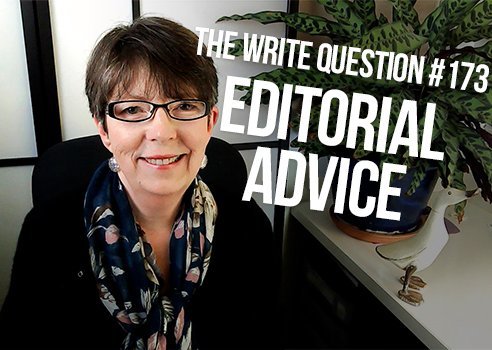Viewing time: 5 mins 3 secs
The Write Question is a weekly video podcast about writing that I started in 2017 and that ran, more or less weekly, until April 2022. This is a republication of issue #173, which describes what happens when you’re struggling with advice from an editor. The post first ran on Feb. 5/21.
Transcript:
What can you do when you’re struggling to follow an editor’s advice? That’s the topic I’m addressing today in The Write Question. I’m Daphne Gray-Grant, the Publication Coach, still in pandemic mode.
I have a question from Filip Rilson, a writer based in Antwerp, Belgium. Here’s what he’s asked by email….
“I’m writing my first novel and I’m in contact with an editor from a good publishing house: she’s very interested and has sent me her first feedback. But now I’m struggling. I feel a lot of resistance against some of her suggestions. I want to please her, but on my own terms, and I now feel completely paralyzed. I feel supreme confusion after each major piece of feedback from her.
I don’t think that I’m arrogant. It’s just that it’s very difficult and painful for me to let go of material that I’ve worked on. And, by the way, using time hasn’t helped! I did put the manuscript away for a month or two this summer and that didn’t help me develop a more objective view. I fear that I’m a text-book case of writer’s block.”
Thanks for your question, Filip. I don’t think you’re arrogant either, but it’s important that you understand both the advantages and possible disadvantages of dealing with editors. I’ll walk you through both sides of the ledger.
To get the ugly out of the way, let’s start with the negatives.
First, it’s surprisingly hard to know whether your editor is a good one — even if she works for a major publishing house. Just as there are good doctors and bad doctors, good lawyers and bad lawyers, there are also good editors and bad ones. And here’s what makes matters even more challenging. Editing is not really a matter of fact, it’s more a matter of taste. If your editor has radically different tastes than you do, you’re bound to come into conflict.
Second, matters of personality might play a role. Some people are friendly and agreeable, while others are curt and dismissive. If you have an editor with few people skills, that could be part of the problem.
Third, and I know this is deeply ironic, but not all editors are really good communicators. Your editor may have a hard time articulating her concerns, which means, of course, that you’re having a hard time understanding them. There’s an old joke that goes, “an editor is someone who knows exactly what they want — when they see it.”
OK, now let’s move on to the positives.
First, an editor is an outside pair of eyes. The big problem facing many writers is that they’re way too close to their own material. As a result, they have no sense of perspective. An editor can be a bridge between you, the author, and the readers you want to enjoy your book.
Second, an editor understands the book business and should have a good sense of what readers are looking for — or at least what their publishing house is hoping to sell. More books sold, will mean greater success for you.
Third, an editor is the key to a publishing deal. It’s actually great news that you HAVE an editor. It means the publishing house has significant faith in you.
Here’s what I suggest: If you’re feeling at your wits’ end, schedule a meeting with your editor and have a frank and open talk with her. You don’t need to pretend to be more confident or assured than you are.
Instead, say things like, “I’m having difficulty really understanding how to fix that section you’ve marked in chapter 3.” Or, “How specifically do you want me to make the character Martin more relatable?”
If you simply disagree with some of her suggestions, tell her that, as well. Editing is not about following orders, you should view it as more of a negotiation.
Editors are meant to HELP you achieve your goals and you shouldn’t ever feel as though they are an enemy, standing in your way.
Finally, let me wrap up with a quote from the English novelist Matt Haig. “To say that creative writing courses are all useless is almost as silly as saying all editors are useless. Writers of all levels can benefit from other instructive voices.”
Filip, I think you may be giving your editor more power than she deserves. Instead, see her as an ally who is going to make suggestions designed to help you sell more books.
*
If you’d like to learn more about how to make writing a happier and more rewarding process, check out my latest book Your Happy First Draft. I don’t sell it in bookstores or via Amazon. The only place to buy it is on my website, link on the screen below and in the show notes.


